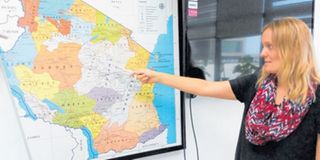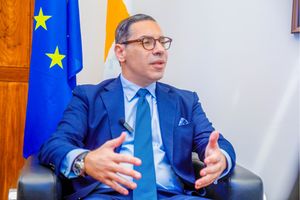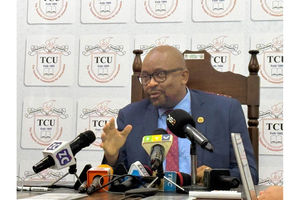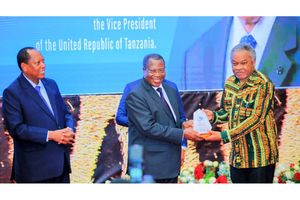Basket from which TZ reaps benefits

What you need to know:
Tanzania receives funding for its health strategic plans from various development agencies through the Health Basket Fund (HBF).
In this interview, Your Health speaks to one of the development agencies, the Korean International Development Agency (KOICA) in trying to find out how Tanzania’s health sector is benefiting from the HBF. KOICA’s Chief of Health, speaks.
Qn: What is, in your opinion, the best way to improve health outcomes in Tanzania?
In my opinion as a Health and Development Specialist, supporting the Health Basket Fund (HBF) is the most efficient way to strengthen the health system in Tanzania.
Channelling funds through the government’s exchequer system, allows for harmonisation and coordination of donor funding. It allows for development partners to support the government’s health strategies, plans and local priorities without creating parallel structures and over-burdening the administrative system. The Tanzanian Health Basket Fund (HBF) not only supports day to day service provision at facility level but also supports coordination and supervision activities at regional and central level for quality control. All HBF activities are budgeted in the regular Government plans and budgets.
The Government has a very capable system in place for donors to pool development funds and HBF monies now flow directly to health facility accounts to allow for more value for money, community involvement for identification of needs, more accountability and better services for customers. The HBF is thus supplements domestic resources and is a crucial resource at the health facilities which rely heavily on HBF monies.
Consequently, health outcomes in Tanzania are improving steadily, most notably in a significant reduction of mortality rates in children under five years old. HIV/AIDS and malaria prevalence rates have also decreased.
Qn: So, how does your role specifically support the Health Basket Fund that you have highlighted?
I have been working on the HBF issues for various bilateral and multilateral development agencies for over 5 years and I have also taken on the role of Audit and Finance Focal Person on behalf of all HBF donors consecutive past 5 years.
KOICA is currently the Focal Person for the HBF’s Audit and Finance Subcommittee. Within this role, KOICA supports the communication between the relevant ministries (Ministry of Finance and Planning, Presidents Office, Regional Administrative and Local Government and the Ministry of Health, Community Development, Gender, Elderly and Children) and donors and thus supports coordination and harmonisation of donor funds.
Specifically, we review all financial and audit reports and work closely with Government counterparts to ensure that reporting is well received and understood by HBF partners. Where queries arise, we consolidate and liaise directly with the respective HBF Coordinators of MoHCDGEC and PORALG to solve any discrepancies or outstanding queries.
Qn: You have been working with KOICA since April 2018 as Chief of Health. What additional value does your role bring to KOICA’s health programming and to the Tanzanian health sector overall?
Having worked in the Tanzanian health sector now for nearly 10 years, I have gained in-depth knowledge of the Tanzanian health system, its policies, strategies and stakeholders.
I am thus able to support KOICA in making informed decisions on how best to support the country’s health strategies and plans. Technical staff provide a bridge between the Government of Tanzania and the respective donor agency to harmonise and coordinate development efforts. In addition I provide technical input to task forces, technical working groupsand other Government led initiatives in order to support the Government of Tanzania to reach its sector milestones.
International agencies in general bring in a wealth of expertise from experienced Public Health Specialists, Medical Specialists, Epidemiologists and statisticians etc which are contributing to an increase in local skills and knowledge and thus helping to move the country forward in achieving its development goals.
Our decision to hire a local Health Specialist not only adds to the wealth of expertise working in the country but also allows for more accountability, oversight and value for money of the ongoing development support to Tanzania.
Ultimately, our goal is to improve the health of those most vulnerable, especially mothers and children.
Qn: We’ve heard about the Korean government’s Official Development Assistance (ODA) program for developing countries. How does Tanzania benefit from it?
Tanzania has benefitted from KOICA’s ODA since 2002. KOICA has also been supporting the country’s development efforts in three main sectors: education, health and water. Between 2002 and 2015, Korea ODA to Tanzania totalled over $80 million, with a significant amount (almost 70 per cent) supporting the health sector through various funding modalities.
In 2016 KOICA joined the HBF, a funding modality whereby 7 major donors (Canada, Denmark, Ireland, Korea, Switzerland, Unicef, World Bank) are pooling funds through the Government’s exchequer system which are then co-mingled with domestic resources to fund the Government’s annual health plans at central, regional and mainly local level (90 per cent of resources).
Since recent, the majority of HBF monies are channelled directly to health facility accounts to support day to day provision of health services at facility level.



